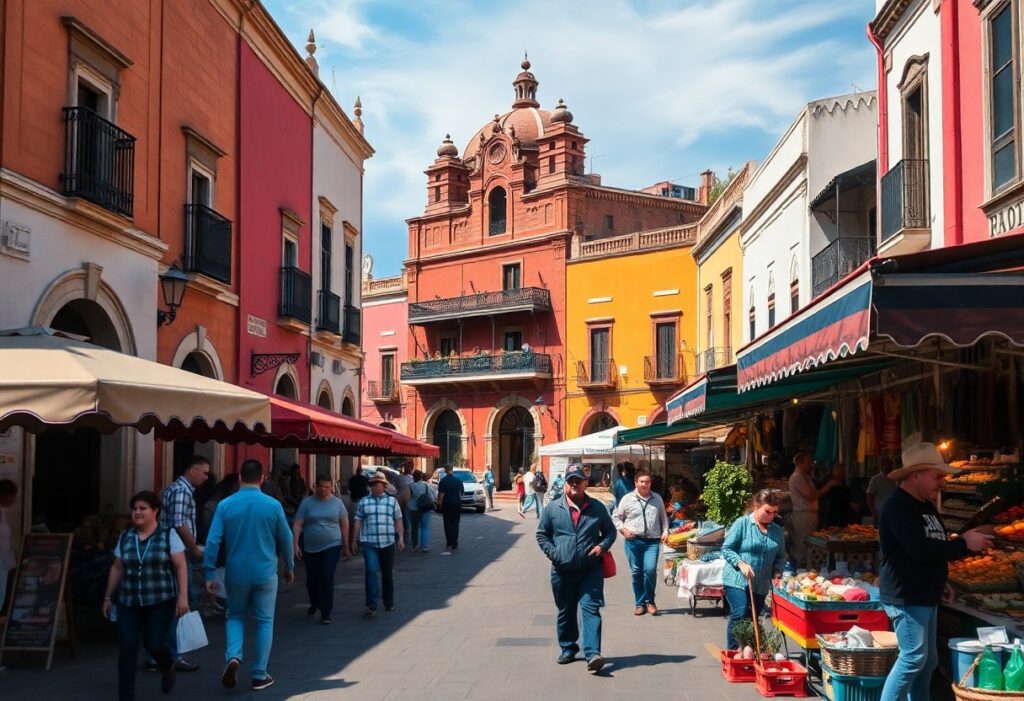Deciding to Relocate: Understanding the Reasons Behind Your Move
Identifying the Signs That Indicate It’s Time for a Change
When considering a major life change, particularly a move away from a beloved city like San Miguel de Allende, it is essential to recognize the signs that suggest it is the right time to make this transition. Often, these signs start off subtly but can build up over time, manifesting as a strong desire for something new. By understanding these indicators, individuals can make informed choices regarding their next steps. Here are some critical signs that may indicate it’s time to relocate:
- Feeling Stagnant in Personal Growth: When your surroundings no longer promote personal and professional development.
- Disconnection from Community: A noticeable distance from the supportive social circles that once felt like home.
- Unrealized Dreams: The feeling that long-held ambitions and aspirations are becoming out of reach.
- Heightened Stress Levels: Regular experiences of anxiety and frustration tied to your daily routine.
- Yearning for New Experiences: A strong curiosity or desire to explore different cultures or lifestyles.
- Shifts in Environment: Changes in your neighborhood or local community that no longer reflect your personal values.
- Health Concerns: Physical or mental health issues that are intensified by your current living situation.
- Financial Difficulties: Circumstances that create economic strain, making it hard to maintain a comfortable lifestyle.
Recognizing these indicators can encourage a reevaluation of your current circumstances, leading to meaningful personal transformation. Life should be a journey of exploration, joy, and satisfaction; when these elements start to fade, it becomes crucial to evaluate what changes can be made.
How Has My Decision to Relocate Impacted My Life?
Choosing to leave a treasured place like San Miguel de Allende can significantly alter various aspects of life. Initially, this decision triggers a whirlwind of emotions, from excitement to anxiety, as the familiar fades and the unknown beckons. In the short term, this choice often sets off a flurry of activities—packing, planning, and preparing for the upcoming chapter. This chaos can invigorate life with a renewed sense of urgency and purpose.
However, the long-term effects are where true transformation occurs. Departing from a community that once provided comfort and familiarity compels individuals to develop resilience and adapt to new surroundings. This journey can encourage personal growth, pushing people beyond their comfort zones and prompting them to acquire new skills and perspectives. Decisions made during this phase, such as pursuing new career paths or hobbies, often lead to surprising opportunities and advancements.
Ultimately, the decision to move serves as a powerful catalyst for self-discovery, enabling individuals to redefine their lives and align them with their evolving goals and aspirations. The impact extends beyond the physical act of relocating; it encompasses the evolution of identity and purpose on a broader scale.
Evaluating the Advantages and Disadvantages of Moving
When considering a significant move, especially from a cherished place like San Miguel de Allende, evaluating the advantages and disadvantages can provide clarity in decision-making. The process involves outlining the benefits of leaving against those of staying, allowing individuals to visualize the implications of each choice. The benefits may include new opportunities for experiences, potential career advancements, and environments that better align with personal aspirations. Conversely, the drawbacks may center around the emotional weight of departing from friends and familiar landscapes.
To facilitate a clearer understanding, consider the following:
- Benefits: New opportunities for personal and professional growth, exposure to diverse cultures, the chance to reinvent oneself, and potential financial advantages in different locations.
- Drawbacks: Loss of community, uncertainty about the future, stress related to relocation, and the possibility of feeling isolated in a new environment.
This thorough evaluation not only clarifies the decision-making process but also helps mitigate potential regrets. Ultimately, weighing the pros against the cons enables individuals to make grounded choices that resonate with their current needs and future aspirations.
How to Prepare Emotionally for Your Move

Getting emotionally prepared is crucial when considering a move from a familiar environment. Taking the time to mentally and emotionally prepare for the transition can ease the process and foster a more positive experience in the new setting. Acknowledging feelings of uncertainty and fear is the first step toward emotional readiness. Recognizing these feelings as normal can help individuals manage them using proactive strategies.
Engaging in practices such as journaling to express your thoughts, seeking support from friends or a counselor, and incorporating mindfulness techniques can assist in processing emotions while building resilience. Creating a farewell ritual, such as hosting a goodbye gathering or expressing gratitude for the time spent in the community, provides closure. It’s vital to honor the past while looking forward to future possibilities.
Moreover, visualizing potential scenarios in the new environment can further alleviate anxiety. By imagining oneself successfully navigating new experiences and forming connections, individuals can cultivate excitement rather than fear about the unknown. Such mental exercises lay the groundwork for a smoother transition.
How to Effectively Communicate Your Decision to Leave
Sharing your decision to leave a place like San Miguel de Allende with friends, family, and colleagues can be a challenging yet necessary step. This communication requires sensitivity and thoughtfulness, as responses can vary widely. Open dialogue not only clarifies your intentions but also helps maintain relationships throughout the transition. It is vital to express your motivations for relocating, emphasizing that this choice stems from a desire for growth and new experiences, rather than rejecting the community.
When discussing your decision, be prepared for a range of reactions, from supportive to resistant. Anticipating questions and concerns can encourage an open dialogue that promotes understanding. Expressing gratitude for the connections made in the community can soften the news and highlight the positive aspects of shared experiences. Offering to keep in touch and suggesting future visits can reassure those who may feel abandoned.
The manner in which one communicates the decision can significantly shape the emotional landscape during the transition, reinforcing supportive connections and alleviating feelings of loss. Thoughtful communication ultimately facilitates a smoother farewell, setting the stage for a positive journey ahead.
Exploring the Emotional and Psychological Effects of Relocation
How to Cope with the Loss of Community After Moving

Leaving behind a community that once offered a sense of belonging can evoke feelings of grief and loss. The emotional impact of such a transition can be profound, influencing overall well-being as individuals confront the absence of familiar faces and routines. Effectively coping with this loss requires intentional strategies to promote healing and adaptation in a new environment.
First and foremost, allowing oneself to grieve the loss of community is essential. Recognizing that grief can manifest in various ways—such as sadness, anger, or even relief—enables healthier processing of emotions. Engaging with local support groups or community activities in the new area can foster a sense of connection and facilitate new friendships. Volunteering or participating in local events can help individuals find their place within a new social framework.
Maintaining connections with friends from the previous community is also crucial. Regular phone calls, video chats, and social media interactions can mitigate feelings of isolation and help preserve relationships despite physical distance. Cultivating an open mindset towards new relationships while cherishing old bonds can enhance emotional resilience and adaptability.
What Are the Psychological Benefits of Relocating?
Relocating to a new environment presents numerous psychological advantages that contribute to overall mental well-being. Fundamentally, moving can revitalize an individual’s perspective on life, offering fresh insights and opportunities for personal development. One of the most significant benefits is the chance to break free from established patterns that may inhibit growth. New surroundings often motivate individuals to explore new hobbies, meet diverse people, and embrace experiences they may have never considered.
Additionally, the act of moving itself cultivates resilience and self-efficacy, as individuals learn to navigate the challenges of adjustment. This newfound confidence can translate into other life areas, inspiring risk-taking and a proactive approach to personal goals. The excitement of discovering a new culture—through local cuisine, festivals, or traditions—can enrich one’s worldview and enhance creative thinking.
Studies have shown that people who relocate frequently report increased life satisfaction and a renewed sense of purpose. The psychological rejuvenation that comes with moving can lead to heightened motivation, improved relationships, and a deeper understanding of one’s identity. Ultimately, the psychological benefits of relocation extend well beyond the physical act, contributing to holistic personal development.
What Strategies Can Help Manage Stress and Anxiety During a Move?
Effectively managing the stress and anxiety associated with moving is essential for a successful transition. The process of relocating, especially from a familiar place like San Miguel de Allende, often entails logistical challenges and emotional hurdles that can overwhelm even the most organized individuals. Implementing effective stress management techniques can facilitate a smoother transition while enhancing overall well-being.
One practical strategy is to create a comprehensive moving plan that outlines tasks and timelines, breaking the process into manageable segments. This structured approach minimizes feelings of overwhelm and provides clarity. Incorporating relaxation techniques such as deep breathing, meditation, or yoga into daily routines can also help alleviate anxiety and promote mental clarity during this hectic period.
Furthermore, maintaining a healthy lifestyle through balanced nutrition, regular exercise, and adequate rest supports mental health during stressful times. Participating in social activities and reaching out to friends for support can further lighten the emotional load, allowing individuals to share experiences and cope collectively. Ultimately, proactive stress management strategies empower individuals to navigate the complexities of moving with confidence and resilience.
How to Overcome Feelings of Isolation After Moving
Feelings of isolation often accompany a move, particularly when transitioning to a new culture or environment. The initial absence of familiar faces and routines can amplify loneliness and hinder emotional well-being. However, recognizing these feelings and actively addressing them is crucial for creating a fulfilling life in a new setting.
Building connections within a new community is key to overcoming isolation. Engaging in local activities, joining clubs, or attending community events can create opportunities for social interaction. Embracing local culture—whether through language courses, culinary experiences, or festivals—facilitates deeper integration and connection with new people. Approaching these activities with an open mind and a willingness to engage fosters genuine relationships.
Leveraging social media and technology can also bridge the gap between old and new connections. Online forums, local community groups, or platforms designed for expatriates can facilitate networking and provide support during the adjustment phase. As individuals proactively take steps to connect with others, feelings of isolation gradually diminish, paving the way for a more fulfilling experience in their new environment.
What Impact Does Moving Have on Family Relationships?
Relocating can significantly influence family dynamics, often reshaping relationships and communication styles within the household. The transition process may evoke a mixture of emotions among family members, including anxiety, excitement, or even sadness. Acknowledging these emotions and promoting open discussions is essential for maintaining family harmony during the move.
It is vital for families to approach the moving process as a shared journey. Involving all family members in conversations about the move, addressing concerns, and sharing expectations can foster a sense of unity. Validating each member’s feelings ensures that everyone feels heard and supported throughout the transition.
Establishing new family traditions in the new location can also strengthen bonds. Exploring the new environment together, participating in local activities, and creating shared experiences can foster positive memories that solidify family relationships in a different context. Ultimately, proactive communication and shared experiences enable families to navigate the challenges of relocation while enhancing their emotional connections.
Expert Opinions on the Reasons Behind My Decision to Leave San Miguel de Allende
What Insights Do Experts Offer About Relocation?
Experts in psychology and sociology frequently highlight the complex impacts of relocation on individuals’ lives. Moving is not just a change in scenery; it involves a multifaceted interplay of emotional and social factors that can significantly influence personal development. Many researchers assert that the decision to relocate often stems from a desire for change, growth, and an improved quality of life. For instance, experts emphasize how moving can stimulate creativity, foster resilience, and enhance social adaptability by exposing individuals to new environments and challenges.
Real-world examples underscore the profound psychological and social benefits of relocation. Individuals who have moved often report higher life satisfaction and a renewed sense of purpose. Experts note that adapting to a new culture typically enhances interpersonal skills and emotional intelligence—crucial traits for success in both personal and professional realms. Such insights highlight the transformative potential of relocation, viewing it as an opportunity for personal evolution rather than merely a logistical challenge.
Strategies to Ensure a Smooth Moving Experience
To achieve a successful relocation, it is essential to implement actionable strategies. A smooth transition begins with thorough planning. Creating a detailed timeline that outlines tasks such as packing, securing housing, and notifying relevant parties can alleviate stress and provide clarity. Additionally, conducting comprehensive research about the new location, including local customs, resources, and potential social connections, can ease adjustment. Understanding the new environment allows individuals to navigate challenges more effortlessly.
Emotionally, fostering a positive mindset is crucial. Practicing mindfulness and self-compassion during this transition enables individuals to manage the emotional highs and lows that often accompany moving. Setting realistic expectations and embracing flexibility can further reduce stress, as unexpected challenges are likely to arise.
Finally, seeking support from friends, family, or local communities can provide essential encouragement throughout the transition. Establishing connections before the move through online forums or social media can foster a sense of belonging, alleviating feelings of isolation that often accompany relocation.
The Importance of Support Systems During Relocation
Having a strong support system is invaluable during the moving process. Friends, family, and community members can offer emotional encouragement, practical assistance, and invaluable advice, all of which contribute to a smoother transition. Support systems can take various forms, from close family members providing emotional support to new acquaintances met in the new community who offer local insights.
When transitioning to a new place, building a network can profoundly impact overall well-being. Engaging with local groups or organizations that align with personal interests can foster connections and create a sense of belonging. Participating in activities, attending local events, or volunteering can expose individuals to like-minded individuals and nurture friendships.
Furthermore, technology facilitates maintaining connections with existing support systems. Regular communication through video calls, messaging apps, or social media can bridge geographical distances, ensuring that emotional support persists even from afar. Ultimately, cultivating a diverse support system enriches the relocation experience, making it a more positive and transformative journey.
Navigating Cultural Adjustment Challenges
Adapting to new cultural norms represents one of the most significant challenges faced during relocation. Moving from a culturally rich area like San Miguel de Allende to a new environment often requires navigating unfamiliar customs, language barriers, and social practices. Although these challenges can feel daunting initially, they also present opportunities for personal growth and enrichment.
Understanding and respecting cultural differences is vital for a successful transition. Engaging in local customs, learning the language, and immersing oneself in the new culture can facilitate adaptation. Taking the time to educate oneself about local traditions, values, and social etiquette fosters respect and acceptance, creating a smooth entry into the new community.
Approaching these cultural challenges with an open mind and a willingness to learn is equally important. Embracing the discomfort that accompanies unfamiliarity can lead to a deeper understanding of one’s own identity while promoting acceptance and appreciation for diversity. As individuals navigate the complexities of cultural adaptation, the process itself can serve as a powerful catalyst for personal development.
Reflecting on Quality of Life After Moving
Quality of life is a pivotal factor in the decision to relocate, particularly when moving from a cherished location like San Miguel de Allende. Individuals often seek environments that better align with their evolving needs and aspirations. Evaluating how changes in lifestyle and environment affect personal well-being is crucial in understanding the motivations for moving.
Factors such as access to healthcare, educational opportunities, affordable living, and available social services significantly influence one’s quality of life. Relocation can enhance these aspects, leading to improved health, happiness, and fulfillment. For many, the desire for a more balanced lifestyle—free from the stresses of their previous environment—fuels the decision to seek new horizons.
Moreover, lifestyle changes accompanying relocation can lead to new practices, routines, and social interactions that enrich daily life. Exploring local markets, participating in community activities, and discovering natural surroundings often contribute to a more vibrant and satisfying lifestyle. Ultimately, reflections on quality of life underscore the transformative potential of relocation, highlighting how new environments can profoundly enhance personal happiness and well-being.
Practical Steps for a Successful Move
How to Plan Financially for a Relocation
Financial planning is a critical component when preparing for a move, especially from a place like San Miguel de Allende to a new location. Understanding the costs associated with relocation can alleviate financial stress and ensure a smoother transition. Conducting a comprehensive assessment of anticipated expenses—including moving fees, housing costs, and potential lifestyle changes—is essential for effective budgeting.
Creating a detailed budget encompassing all aspects of the move helps identify potential financial pitfalls and allocate resources judiciously. It is also wise to consider the cost of living in the new area, as this can significantly impact monthly expenses. Researching housing options, transportation costs, and everyday expenses will provide clarity and help set realistic financial goals.
Additionally, exploring opportunities to save money during the moving process can help alleviate financial burdens. This may include decluttering before the move to reduce packing and transportation costs or seeking discounts on moving services. Ultimately, thorough financial planning lays the groundwork for a successful relocation experience, reducing stress and enhancing overall well-being.
What Logistical Considerations Should Be Made Before Moving?
Logistics play a crucial role in the success of a move, particularly when transitioning from a beloved location like San Miguel de Allende. Several key logistical elements must be considered to ensure a seamless transition to a new environment. First and foremost, creating a timeline for the move is essential. This timeline should outline critical milestones, including packing schedules, transportation arrangements, and finalizing housing details.
Transportation logistics require careful attention, especially if relocating internationally or over long distances. Researching options for professional moving services, renting vehicles, or utilizing shipping containers can simplify the process. Additionally, securing housing before the move—whether through renting or purchasing property—is vital. Understanding local real estate markets and negotiating terms can significantly impact the moving experience.
Lastly, timing is another crucial consideration. Factoring in seasonal elements, such as weather conditions or local events that may affect moving logistics, can streamline the process. By addressing these logistical aspects, individuals can facilitate a smoother transition to their new home.
How to Tackle Legal and Administrative Tasks When Moving?
Navigating the legal and administrative requirements of moving can be one of the more complex aspects of relocation. Ensuring that all necessary documentation is in order—including identification, work permits, housing contracts, and registration documents—is crucial for a successful transition. Familiarizing oneself with the legal requirements of the new location is essential; this may involve understanding local regulations or seeking assistance from legal professionals.
Additionally, updating essential records—such as banking information, vehicle registrations, and health insurance policies—should take priority. Establishing connections with local services, including utility providers and healthcare facilities, can streamline the transition process. Creating a checklist of administrative tasks to complete before and after the move can help avoid any oversight.
Being proactive in addressing these legal and administrative tasks minimizes stress and enhances the overall moving experience, ensuring a smoother transition to the new environment.
Adjusting to New Cultural and Social Norms
How to Adapt to New Social Norms After Moving
Adjusting to new social norms is one of the most critical aspects of relocating to a different environment. Moving from a culturally rich area like San Miguel de Allende to a new location often requires immersing oneself in unfamiliar customs, social practices, and communication styles. Understanding these new social norms is essential for fostering positive interactions and building relationships in the new community.
Beginning this adaptation process involves observing and listening to local practices. Attending community events, participating in local traditions, and engaging with residents can provide invaluable insights into the cultural fabric of the area. Furthermore, asking questions and seeking clarification when uncertain about local customs fosters respect and a willingness to learn, ultimately easing the adjustment process.
Moreover, actively engaging in conversations and being open to different viewpoints fosters social connections and enriches one’s understanding of the new environment. Embracing diversity and practicing empathy can enhance interpersonal relationships, paving the way for deeper connections and a sense of belonging in the new community.
Building New Friendships After Relocating
Establishing new friendships and professional connections in a new setting is vital for creating a sense of belonging and support. After leaving a familiar place like San Miguel de Allende, building a new social network may seem daunting, but it is entirely achievable with intentional effort. One effective approach is to engage in local activities or hobbies that resonate with personal interests. Whether it involves joining clubs, attending workshops, or participating in community events, these opportunities enable individuals to connect with like-minded individuals.
Additionally, utilizing social media platforms to reach out to local groups can facilitate networking and relationship-building. Online forums or community pages frequently offer information about local events or activities, fostering connections with others who share similar interests. Volunteering for local causes not only contributes to the community but also creates a platform for meeting new people and nurturing meaningful relationships.
Ultimately, approaching the task of relationship-building with an open heart and a willingness to connect fosters positive social interactions and enhances the overall moving experience.
What Challenges Are Common During Cultural Adaptation?
Adapting to a new culture can present various challenges that require patience, resilience, and a proactive mindset. Relocating from a distinct cultural setting like San Miguel de Allende often entails encountering unfamiliar customs, communication styles, and social practices. These cultural adjustments may lead to feelings of confusion or frustration, particularly during initial encounters.
Common challenges include language barriers, differing social etiquettes, and varying perspectives on everyday practices. Navigating these differences may require individuals to step outside their comfort zones and embrace learning opportunities. Seeking language courses or cultural workshops can facilitate understanding and ease communication difficulties. Engaging with locals and asking questions about cultural norms fosters respect and accelerates the adaptation process.
Moreover, approaching these challenges with a growth mindset—viewing them as opportunities for learning and personal development—can transform the relocation experience into a rich journey of self-discovery. Ultimately, overcoming cultural adaptation challenges not only enhances the experience of living in a new place but also enriches one’s understanding of diverse perspectives and lifestyles.
Fostering Personal Growth Through Relocation
How Relocation Unlocks Opportunities for Self-Discovery
Relocating to a new environment can serve as a powerful catalyst for self-discovery and personal growth. Leaving a familiar place like San Miguel de Allende often unlocks opportunities for individuals to explore their passions, values, and aspirations in new contexts. The process of adapting to a different culture and lifestyle encourages individuals to step outside their comfort zones, fostering introspection and self-awareness.
New experiences—whether through travel, meeting diverse people, or engaging in local customs—can illuminate previously unexplored interests and talents. This journey of self-discovery often leads to a deeper understanding of one’s identity and a more authentic expression of self. Embracing the unknown allows individuals to redefine their personal narratives and reshape their paths moving forward.
Additionally, the challenges encountered during this transition—such as navigating unfamiliar situations or overcoming language barriers—cultivate resilience and adaptability. These qualities are vital for personal growth, empowering individuals to confront challenges with confidence and curiosity. Ultimately, the opportunities for self-discovery that arise from moving highlight the potential for profound personal transformation.
What Skills Can Be Developed Through the Moving Process?
Relocating to a new environment fosters the development of a diverse range of skills that enhance both personal and professional capabilities. Moving involves navigating logistical challenges, managing emotional transitions, and adapting to new social norms—all of which cultivate valuable competencies. One of the most significant skills honed through moving is adaptability. The ability to adjust to new circumstances and environments is crucial in today’s fast-paced world, and relocation provides ample opportunities to refine this skill.
Interpersonal skills also improve significantly during the moving process. Engaging with new people and building relationships in a different culture fosters emotional intelligence, communication skills, and empathy. These competencies enhance personal interactions and can be invaluable in professional settings, creating opportunities for collaboration and networking.
Furthermore, problem-solving skills are sharpened as individuals face and navigate the challenges related to relocation. Overcoming obstacles—whether logistical, cultural, or emotional—enhances critical thinking and decision-making abilities. Ultimately, the skills developed through moving contribute to holistic personal development, equipping individuals for success in various aspects of life.
How to Embrace Change and Uncertainty While Moving
Embracing change and uncertainty is essential for thriving in new situations, particularly during a significant transition like relocating. Moving from a familiar environment like San Miguel de Allende to an unknown setting can evoke feelings of fear and hesitation. However, adopting a positive mindset towards change can transform this uncertainty into an opportunity for growth.
Practicing mindfulness and self-compassion can help individuals navigate the emotional ups and downs associated with moving. Acknowledging that discomfort is a natural part of the process allows for a more profound experience of growth and learning. Setting realistic expectations and focusing on the positive aspects of the move—such as new experiences, relationships, and opportunities—can foster a more optimistic outlook.
Additionally, cultivating a curious mindset encourages exploration and open-mindedness, enhancing one’s ability to embrace the unknown. Viewing challenges as opportunities for growth and development creates resilience and adaptability, vital traits in today’s ever-changing world. Ultimately, embracing change and uncertainty enriches the relocation experience, laying the groundwork for a fulfilling and vibrant life ahead.
Research-Backed Insights on the Benefits of Relocating
What Do Studies Reveal About the Impact of Relocation?
Research consistently highlights the myriad psychological and social benefits of relocation. Studies indicate that individuals who move often report enhanced happiness, increased life satisfaction, and improved mental health. The act of moving itself serves as a catalyst for change, offering new perspectives and opportunities that foster personal growth. When individuals leave familiar environments, they often find renewed motivation and purpose, leading to a more fulfilling life.
Moreover, relocating can enhance social connections as individuals engage with new communities. Studies demonstrate that the ability to forge new relationships and integrate into different social networks can significantly impact overall well-being. This newfound social support often contributes to improved mental health outcomes, reinforcing the idea that relocation can lead to positive changes in life circumstances.
Furthermore, research supports the notion that individuals who embrace change tend to experience greater resilience and adaptability—key traits that enhance overall quality of life. Ultimately, insights from these studies underscore the profound benefits of moving, framing it as a transformative experience for personal development.
What Does Data Indicate About the Positive Effects of Moving?
Data on relocation reveals compelling insights into the positive outcomes associated with moving. Surveys indicate that a significant percentage of individuals who relocate report heightened levels of happiness and satisfaction with their lives. Many describe their moves as transformative experiences that have enriched their quality of life, providing new opportunities for personal and professional growth.
Furthermore, research shows that people who move often experience a sense of renewal and increased motivation in their personal and professional pursuits. The act of relocating can reinvigorate aspirations and inspire individuals to pursue new goals and interests. Additionally, data suggests that social connections formed in new environments frequently lead to lasting relationships that enhance overall well-being.
Overall, the data underscores the transformative power of moving, illustrating how this significant life change can yield lasting benefits that contribute to improved life satisfaction and personal achievement.
What Are the Long-Term Effects of Relocation?
The long-term effects of relocation can be profound, shaping personal and professional trajectories in meaningful ways. Individuals who move often find that the skills developed during the transition—such as adaptability, resilience, and social intelligence—continue to benefit them long after the move is completed. These skills enhance personal relationships, career prospects, and overall life satisfaction.
Moreover, research suggests that people who embrace relocation often develop a more nuanced understanding of cultural diversity and global perspectives. This enhanced worldview fosters empathy, adaptability, and curiosity—vital traits in an increasingly interconnected world. Additionally, the social networks established in new environments can provide ongoing support and opportunities, further enriching individuals’ lives.
Ultimately, the long-term effects of relocating extend beyond immediate benefits, contributing to a more fulfilling and enriched life. The journey of moving, while challenging, often leads to sustained personal growth and development that shapes individuals for years to come.
How to Maintain Connections After Relocating
What Are Effective Ways to Stay in Touch with Old Friends?
Maintaining relationships with friends from a previous home is vital for emotional well-being after relocating. Leaving a cherished location like San Miguel de Allende can evoke feelings of nostalgia and loss, making it essential to actively nurture existing friendships. Regular communication through phone calls, messaging apps, and social media platforms can bridge the gap created by geographical distance, allowing friendships to flourish despite the change in location.
Establishing a routine for check-ins—whether through weekly calls or monthly video chats—can foster a sense of continuity and connection. Additionally, sharing updates about new experiences and milestones keeps old friends engaged in personal journeys, reinforcing those bonds. Planning visits or reunions, even infrequently, strengthens connections and creates lasting memories that enrich friendships.
Ultimately, staying in touch with old friends provides emotional support, nurtures a sense of belonging, and enriches life with cherished connections that transcend distance.
How Can Technology Aid in Maintaining Friendships?
In today’s digital age, technology plays a crucial role in maintaining connections, particularly after relocating. Social media platforms, messaging apps, and video conferencing tools facilitate communication, enabling individuals to share their experiences with friends and family from afar. These technologies create opportunities for virtual gatherings, allowing friends to connect and engage despite physical separation.
Utilizing apps specifically designed for social networking can also enhance connections. Platforms that foster community engagement, such as local interest groups or expatriate forums, help individuals maintain relationships with people from their previous location while also forming new connections in their new environment.
Moreover, technology offers creative avenues for engaging with old friends, from sharing photos and updates to hosting virtual game nights or watch parties. Embracing these tools enables individuals to cultivate relationships that thrive, even across distances, enriching both old and new social landscapes.
How to Balance Old and New Friendships After Moving?
Finding balance between nurturing old friendships and forging new connections is essential during a transition to a new environment. While maintaining relationships with old friends is crucial for emotional support, building new friendships enhances the moving experience and fosters a sense of belonging in the new community. To achieve this balance, individuals can set specific goals for both aspects of their social lives.
Regularly scheduling time for old friends—whether through calls, messages, or planned visits—reinforces those connections while opening the door to new relationships. Simultaneously, actively seeking social opportunities in the new environment enables individuals to build their local network. Engaging in community activities, attending events, or joining clubs related to personal interests creates avenues for meeting new people.
Ultimately, fostering a harmonious balance between old and new friendships enriches one’s social life, promoting emotional well-being and a heightened sense of community in both old and new environments.
Engaging in Local Community Activities to Build Connections
Participating in local community activities is a vital strategy for fostering new connections and integrating into a new environment after relocating. For individuals moving from a vibrant cultural hub like San Miguel de Allende, engaging in community events provides opportunities to meet new people and establish roots in the area.
Local events, such as festivals, markets, or cultural celebrations, offer rich backdrops for interaction and engagement. Volunteering for community service projects can create meaningful connections while positively contributing to the new environment. By actively participating in community initiatives, individuals not only build relationships but also gain a deeper understanding of local customs and social dynamics.
Moreover, joining clubs or classes that align with personal interests fosters connections with like-minded individuals, creating a sense of camaraderie and shared experiences. Ultimately, engaging in community activities cultivates a sense of belonging, enriching the relocation experience and enhancing emotional well-being.

Reflections and Valuable Lessons from My Relocation Journey
What Insights Have I Gained from My Relocation Experience?
Reflecting on the experience of relocating can unveil valuable insights and lessons learned throughout the journey. Each move, particularly one from a cherished place like San Miguel de Allende, offers opportunities for introspection and growth. One key lesson is the significance of adaptability; navigating new environments cultivates resilience and strengthens problem-solving skills, which often translates to increased confidence in facing future challenges.
Moreover, this experience highlights the importance of community and relationships. Building new connections while nurturing old friendships emphasizes the value of social support in enhancing overall well-being. Learning to embrace change emerges as another crucial lesson, fostering growth and new opportunities.
Ultimately, every moving experience is a unique journey that enriches one’s understanding of self and others, shaping perspectives and instilling a sense of empowerment.
How Has My Perspective Shifted Since Moving?
The perspective gained from the process of relocating, especially from a beloved location like San Miguel de Allende, can be transformative. Moving often encourages individuals to reevaluate their values, priorities, and aspirations. This introspection leads to a deeper understanding of what truly matters in life, fostering an appreciation for diversity and new experiences.
Additionally, exposure to different cultures and lifestyles broadens one’s worldview, enhancing empathy and openness towards others. This shift in perspective nurtures curiosity and a deeper appreciation for the richness of human experiences. The realization that life is a series of transitions inspires individuals to embrace uncertainty and view change as an opportunity for growth.
Ultimately, this newfound perspective cultivates resilience and adaptability, essential traits for navigating life’s complexities and fostering meaningful connections.
How to Apply Lessons Learned to Future Decisions
The insights and lessons learned from relocating can profoundly influence future life choices and transitions. Understanding the importance of adaptability serves as a guiding principle when facing new challenges. This adaptability fosters confidence in navigating uncharted territories, whether related to personal or professional pursuits. Embracing change as a constant in life encourages individuals to approach future decisions with an open mind, ready to seize opportunities as they arise.
Moreover, the value placed on relationships and community can shape future choices regarding where to live, work, and engage. Seeking environments that foster connection and support can lead to more fulfilling experiences and enhanced overall well-being. Applying these lessons to future transitions ensures that individuals continue to evolve and grow, creating meaningful lives enriched by diverse experiences and connections.
Frequently Asked Questions About Relocating
What Are the Main Reasons People Leave San Miguel de Allende?
Many individuals leave San Miguel de Allende in search of new opportunities, lifestyle changes, or a desire for different cultural experiences. Factors such as personal growth, financial considerations, and community dynamics also play significant roles in the decision to relocate.
How Can I Prepare Emotionally for a Move?
Emotional preparation involves recognizing feelings of anxiety or fear, engaging in mindfulness practices, and creating a farewell ritual. Acknowledging these emotions and seeking support from friends or professionals is essential for navigating the transition smoothly.
What Practical Steps Should I Take Before Moving?
Practical steps include creating a detailed moving plan, researching housing options, budgeting for expenses, and notifying relevant parties. Ensuring that essential documentation is organized is also crucial for a seamless transition.
How Can I Maintain Relationships with Friends After Moving?
Maintaining relationships can be achieved through regular communication via phone calls, messaging apps, or social media. Planning visits or reunions reinforces connections despite geographical distances.
What Are the Benefits of Moving to a New Location?
Moving can lead to increased life satisfaction, new opportunities for personal and professional growth, and enhanced social networks. Relocation often fosters adaptability and resilience, contributing to overall well-being.
What Challenges Might I Face When Adapting to a New Culture?
Challenges include navigating language barriers, understanding social norms, and overcoming feelings of isolation. Embracing a curious mindset and actively engaging with the local culture can ease these adjustments.
How Can I Build New Relationships in a New City?
Building new relationships can be facilitated through participating in local activities, joining clubs, or volunteering. Engaging with the community fosters connection and creates opportunities for friendship.
What Skills Can I Develop Through the Moving Process?
Relocating enhances adaptability, problem-solving skills, and emotional intelligence. Building new social networks also fosters interpersonal skills that are invaluable in both personal and professional settings.
How Do I Handle the Stress and Anxiety of Moving?
Managing stress involves creating a comprehensive moving plan, practicing relaxation techniques, and maintaining a healthy lifestyle. Seeking support from friends or the community can also alleviate anxiety during the transition.
What Long-Term Effects Can Relocation Have on My Life?
Long-term effects often include enhanced resilience, broadened perspectives, and improved social connections. Individuals frequently experience sustained personal growth and satisfaction as a result of their relocation experiences.
See also: Travel & Adventure.
See also: Local Transport & Excursions.
Cameron Hale is an insightful author and enthusiast of San Miguel de Allende, where he explores the rich culture, history, and vibrant community of this enchanting Mexican city. With a keen eye for detail and a passion for storytelling, he captures the essence of life in San Miguel, sharing unique perspectives on its art, cuisine, and local traditions. Through his engaging writing, Cameron invites readers to discover the charm and allure of this remarkable destination.





In contemplating a move away from a city that holds such rich cultural and historical value, like San Miguel de Allende, I find it fascinating how the emotional ties we develop can sometimes cloud our judgment about necessary change. The signs you laid out resonate deeply; it’s often that sense of stagnation that prompts reflection on our circumstances.
I appreciate how you’ve framed the decision to relocate as not just a physical move, but a pivotal moment in personal growth. I recently experienced a similar crossroads in my life, and it was definitely a blend of subtle signs that ultimately led me to make a significant change. For me, feeling stagnant in my professional life prompted introspection about what truly brings fulfillment.
This really resonates with me. I’ve experienced that feeling of stagnation before in a place I thought I’d never want to leave. It’s interesting how our environments can either fuel or stifle our growth. I remember after a few years in a city that used to inspire me; I found myself questioning my purpose and the path ahead. I ultimately made the leap to a new location, and it sparked a wave of creativity and connection I hadn’t realized I was missing.
Your reflections on the signs that indicate it’s time to relocate struck a chord with me. I think many people have experienced that subtle, creeping feeling of stagnation in personal growth, especially in a vibrant place like San Miguel de Allende, which has so much to offer. It’s fascinating how a city can become both a source of inspiration and a comfort zone that ultimately limits our experiences.